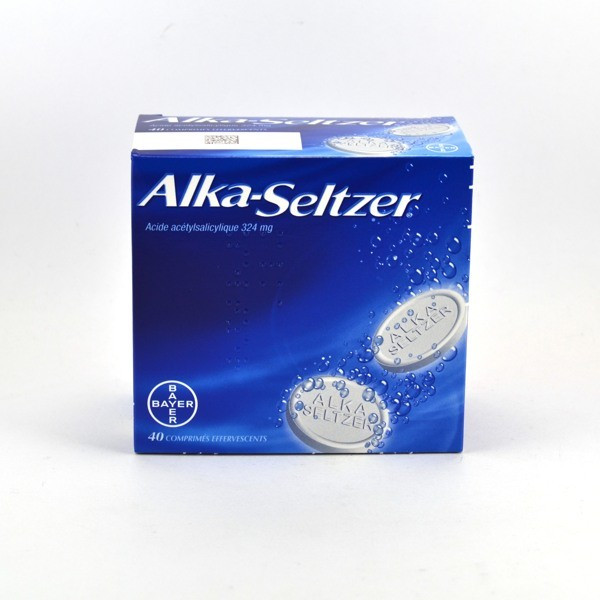Indication
This medicine contains aspirin. It is indicated in the event of pain and / or fever such as headaches, flu-like conditions, dental pain, stiffness, in adults and children from 20 kg (approximately 6 years). For children of different weight or age, there are other types of aspirin available: ask your doctor or pharmacist for advice.
Dosage
Oral route. Drink immediately after the effervescent tablet has completely dissolved in a large glass of water.
This presentation is reserved for adults and children from 20 kg (approximately from 6 years old). The dosage of aspirin depends on the weight of the child; ages are given for information. If you do not know the child's weight, it should be weighed to give the best dose. Aspirin exists in many dosages, allowing treatment to be adapted to the weight of each child. The recommended daily dose of aspirin is approximately 60 mg / kg / day, divided into 4 or 6 divided doses, i.e. approximately 15 mg / kg every 6 hours or 10 mg / kg every 4 hours.
For children weighing 20 to 26 kg (approximately 6 to 10 years), the dosage is 1 unit per dose, to be renewed if necessary after 6 hours, without exceeding 4 units per day.For children weighing 27 to 36 kg (approximately 8 to 12 years), the dosage is 1 unit per dose, to be renewed if necessary after 4 hours, without exceeding 6 units per day.
For children weighing 37 to 50 kg (approximately 11 to 15 years), the dosage is 2 units per dose, to be repeated if necessary after 6 hours, without exceeding 8 units per day.
For adults and children weighing more than 50 kg (from about 15 years old): the maximum recommended daily dose is 3 g of aspirin, i.e. 9 units per day The usual dose is 2 units at 324 mg, to be renewed if necessary after a minimum of 4 hours, without exceeding 9 units per day.
For the elderly: The maximum recommended daily dose is 2 g of aspirin, or 6 units per day. The usual dosage is 1 unit at 324 mg, to be renewed if necessary after a minimum of 4 hours, without exceeding 6 units per day.
Systematic catches prevent oscillations of pain or fever. In adults, they should be regularly spaced at least 4 hours apart. In children, they should be regularly spaced, including at night, preferably 6 hours and at least 4 hours: comply with the dosage specified above.
Composition
The active substance is: Acetylsalicylic acid ........................................... .................................................. ........................ 324 mg
For an effervescent tablet.
The other ingredients are: Sodium bicarbonate, sodium carbonate, anhydrous citric acid.
Precautions for us
Pain or fever This dosage is suitable for adults and children from 20 kg (approximately 6 years). For children under 20 kg (approximately 6 years), take a more suitable dosage. Seek advice from your doctor or pharmacist. If the pain persists for more than 5 days or the fever for more than 3 days, or in the event of insufficient efficacy or the occurrence of any other sign, do not continue the treatment without the advice of your doctor. · Aspirin increases the risk of bleeding from very low doses, even when the intake is several days old. TELL YOUR ATTENDING DOCTOR, SURGEON, ANESTHESIST OR YOUR DENTIST, in the event that a surgical procedure, even minor, is being considered. Aspirin changes the uric acid level (amount of uric acid in the blood). · This medicine contains sodium. This medicinal product contains 477 mg of sodium per tablet. To be taken into account in patients controlling their dietary sodium intake.
Pregnancy and breast feeding
Pregnancy
This medication is intended for children from 20 kg (approximately 6 years old). However, when used in exceptional circumstances in women of childbearing age, the following points should be remembered: Low doses, less than 100 mg per day: Low doses of acetylsalicylic acid less than 100 mg per day, may be prescribed in exceptional circumstances requiring specialized supervision. For doses greater than 100 mg per day At these doses, and unless absolutely necessary, acetylsalicylic acid should not be prescribed during the first two trimesters of pregnancy. If acetylsalicylic acid is administered to a woman who wants to be pregnant or less than six months pregnant, the dose should be as low as possible and the duration of treatment as short as possible. At doses greater than 100 mg per day, acetylsalicylic acid is contraindicated beyond 5 months of pregnancy (24 weeks of amenorrhea). You should UNDER NO CIRCUMSTANCES take this medication during the third trimester of pregnancy because its effects on your child can have serious consequences, especially on a cardio-pulmonary and renal level, even with just one dose. If you took this medicine while you were pregnant, talk to your obstetrician gynecologist so that you can be offered appropriate monitoring. Ask your doctor or pharmacist for advice before taking any medicine.
Feeding with milk
As aspirin passes into breast milk, this medication is not recommended during breast-feeding. Ask your doctor or pharmacist for advice before taking any medicine.




